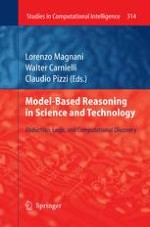2010 | OriginalPaper | Chapter
Abduction, Induction, and Analogy
On the Compound Character of Analogical Inferences
Author : Gerhard Minnameier
Published in: Model-Based Reasoning in Science and Technology
Publisher: Springer Berlin Heidelberg
Activate our intelligent search to find suitable subject content or patents.
Select sections of text to find matching patents with Artificial Intelligence. powered by
Select sections of text to find additional relevant content using AI-assisted search. powered by
Analogical reasoning has been investigated by philosophers and psychologists who have produced different approaches like “schema induction” (Gick and Holyoak) or the “structure-mapping theory” (Gentner).What is commonplace, however, is that analogical reasoning involves processes of matching and mapping. Apart from the differences that exist between these approaches, one important problem appears to be the lack of inferential precision with respect to these processes of matching and mapping. And this is all the more problematic, because analogical reasoning is widely conceived of as “inductive” reasoning. However, inductive reasoning - in a narrow and technical sense - is not creative, whereas analogical reasoning counts as an important source of human creativity. It is C. S. Peirce’s merit to have pointed to this fact and that induction can merely extrapolate and generalize something already at hand, but not the kind of reasoning that leads to new concepts. Indeed, inventive reasoning is usually identified with abduction, and consequently abduction should play at least some role in analogy. Peirce has claimed that analogy is a compound form of reasoning that integrates abduction and induction, but the intriguing question is still, how these two inferences are to be reconstructed precisely. In the proposed paper I hold that analogical reasoning can indeed be analyzed in this way and that this helps us to reach a much more precise and differentiated understanding of the forms and processes of analogical reasoning. In particular I hold that (at least) two forms of analogical reasoning have to be distinguished, because they represent different inferential paths. The underlying inferential processed will be explicated in detail and illustrated by various examples.
